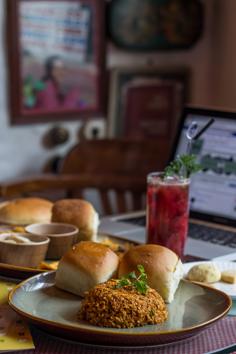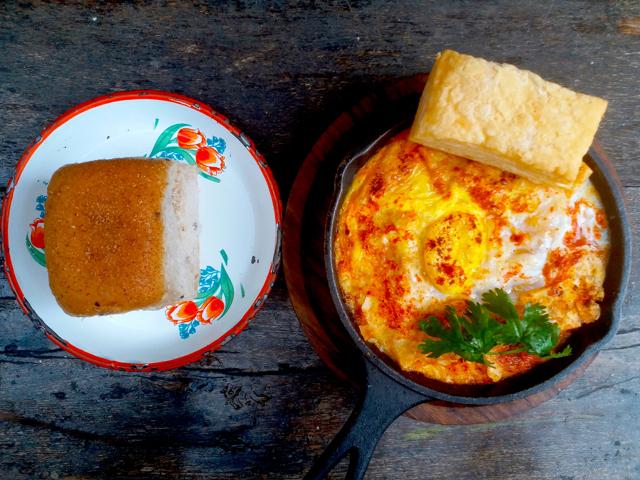The strange Parsi love affair with eedu: Maska Maarke with Kunal Vijayakar
To make life and prayer easy for the meat-loving Parsis, some wise forebearers permitted eggs during the Bahman month of abstinence, making them that much more loved by the community.
Parsi and vegetarian, and never the twain shall meet. It is almost like oil and water. Parsi and vegetarian, the words just don’t go together. Or at least that’s what the stereotype dictates. Because the Parsi vegetarian dishes we know of are few and far between. There is of course Lagan na Stew, a sweet and sour dish of finely chopped roots and vegetables. Pulses like Titori (sprouted vaal) and Ravaiya (chutney-stuffed brinjal). Beyond that the Parsi favourites are either fish-based, meat-based or egg-based.

But there is one month in the Parsi calendar (somewhere around June) when devout Parsis turn vegetarian. Yes, one full month of vegetarian food. They call it the month of Bahman; I call it the month of panic. Because that’s when mothers, housewives and homemakers get hysterical about what food to cook. Although the Parsis cook nearly every vegetable in the market, their recipes and traditions nudge them to either add meat or eggs, rendering all their attempts at making a vegetarian dish unequivocally non-vegetarian.
So to make life and prayer easy for this meat-eating community, some wise forebearers permitted the eating of eggs and fish during this month of Bahman, making eggs an essential and obstinate part of the Parsi cuisine.
The egg also plays a unique role in Parsi religious ceremonies, blessings and tradition. The egg is symbolically used, in the same way that the Hindus use and break a coconut. This places the egg high up in the pecking order of cuisine and ritual.

Is it any wonder then that the Parsis have such a torrid relationship with eggs? Starting with the simplest, the Charvelu Eedu or scrambled egg. Soft scrambled eggs slowly cooked with milk, with just the hint of a slit green chilli. Eggs that always taste better with dollops of butter and, in winter months, finely chopped fresh green garlic. To these scrambled eggs if you add masala, fried or spring onions, maybe tomato, it turns magically into an Akuri, a creamy, spicy preparation that is often insulted when wrongly called a “bhurji”.
As if one Akuri was not enough, the Parsis have another two versions of the dish: the Bharuchi Akuri and the Bafela Eeda Ni Akuri. The Bharuchi Akuri is a rich variant of scrambled eggs, made in ghee, with finely chopped green chillies and crisply fried onions. The spices are replaced with dry fruit like raisins and nuts. This is a rich, nutty delightful dish that is often served at traditional Parsi weddings.
The Bafela Eeda Ni Akuri, as the name suggests, is made with boiled eggs. After they’ve been hard-boiled, the eggs are chopped horizontally into four pieces. Set aside. Then fry finely diced potato and onion in ghee until golden brown. Add to that a chutney of green chillies, coriander, raw mango, mint, garlic, cumin, fennel, salt and sugar and mix the masala and potatoes gently. Add the boiled eggs, mix gently so the yellows don’t separate from the whites. Cover the pan and let it cook for a minute more. The Bafela Eeda Ni Akuri tastes best with kadak brun pav.
The Parsis also have their own version of the Omelette. It’s called Pora, and takes a humble daily breakfast and gives it hearty robustness and hefty character. Eggs are beaten with browned onions, green chillies, lots of coriander, spices, even raw mango when in season, and then deep-fried till golden. This omlette with pav, is sex on toast.
Eggs are also used extensively in frying. Be it potato chops, Margi-na-Farcha or Lacey Mutton Cutlets, there is no frying without an egg dip. The trick to achieving the laciness, by the way, is to add cubes of ice or really cold water to the beaten eggs. When a cutlet or piece of chicken is crumbed, dipped in this cold egg batter and slid into boiling oil, the cold water and hot oil fight viciously and violently splutter to form the crisp lacey coating.
We all know that the Parsis will eat anything “on eggs” or “per-eeda”. Starting with the ordinary salli-per-eeda (eggs on potato straws), bhida-per-eeda (eggs on ladyfinger), tamota-per-eeda (eggs on masala tomato) and bhaji-per-eeda (eggs on fenugreek leaves), and moving to the extraordinary sekta-ni-sing-per-eeda (eggs on drumstick) and fried-kera-per-eeda (eggs on fried bananas). So why not eggs cooked on clotted cream? Malai-per-eeda!
The recipe for malai-per-eeda is very similar to the English breakfast of coddled eggs. The difference is that malai-per-eeda is enriched with clotted cream. The thick cream is layered at the bottom of a ramekin or a glass baking dish. The cream is sprinkled with finely chopped coriander and green chillies. Break the eggs on top, cover and cook over a bain-marie or a double boiler for just a few minutes, till the egg whites stiffen slightly and turn white. If I were you, I’d grate a little English cheddar on top. Voila! Malai-per-eeda.
There are tonnes of possibilities with the egg. And anything you come up with on eeda, the average Parsi will likely already have tried, or will actively relish. In fact, for good luck, instead of saying ‘Break a leg’, you could easily get away with ‘Break an egg’!



